The Windows 10 Review: The Old & New Face of Windows
by Brett Howse on August 25, 2015 8:00 AM EST- Posted in
- Operating Systems
- Microsoft
- Windows 10
Windows 10 Editions
Branding Windows has been somewhat hit and miss over the last couple of generations. Microsoft took the entire exercise a bit too far over the Windows Vista and Windows 7 period, with a lot of different versions that had different features available. With Windows 8, they moved to just a couple of different versions which simplified the selection. Windows 8 Core was the one most people needed, and Pro offered a few more features that most home users would not need, such as the ability to join a domain, or use Remote Desktop. There was also an edition for volume license customers called Enterprise, and it contained every feature.
Windows 10 continues down this path, but rebrands the home version Home again. That makes a lot of sense since the “core” branding on Windows 8 was kind of silly.
Once again, there are two basic versions which you can purchase. Windows 10 Home, and Windows 10 Pro are both going to be offered in retail sales, and once again there is a volume license version called Enterprise, and another carryover from is a special version of Enterprise for education, called, you guessed it, Education.
Education and Enterprise are almost identical, with only a couple of differences. But most of us are going to be using Windows 10 Home or Pro.
As before, Windows 10 Home is a subset of Pro, with Pro offering features that are aimed more towards business users. The one big exception is Bitlocker support, which is Microsoft’s drive encryption software. Many people were hoping to see this come to the Home version for this round, but alas, that is not the case.
All versions except Home also support a new Windows Update for Business service, which is a method for companies to deploy and manage updates. Windows Server Update Services is the existing method for this, and that also still exists for customers who want to keep that level of control.
Speaking of updates, Windows 10 no longer offers a way to disable Windows Updates in the settings page. Pro will let you defer feature updates, but not security updates, and Enterprise versions will offer a long term servicing branch option, but the goal here is to keep Windows up to date going forward.


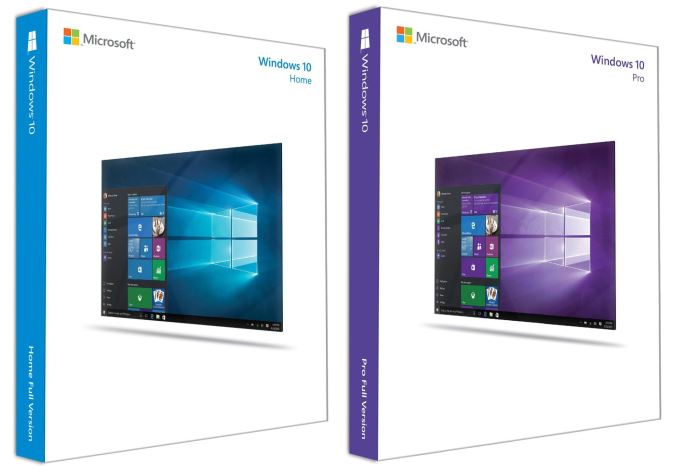
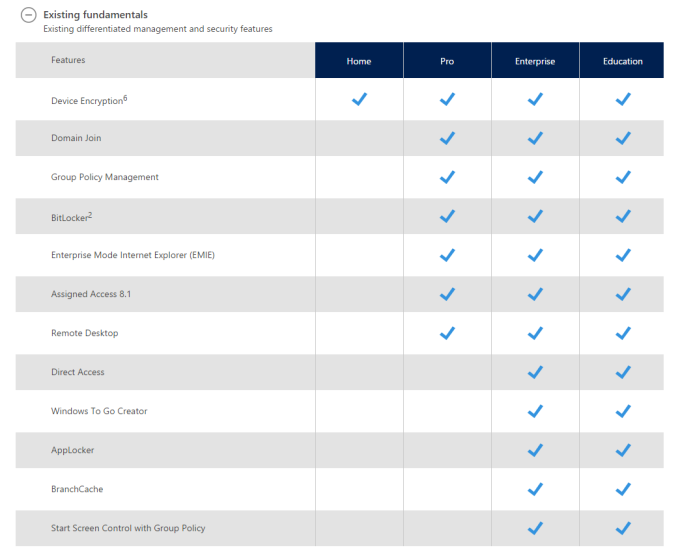
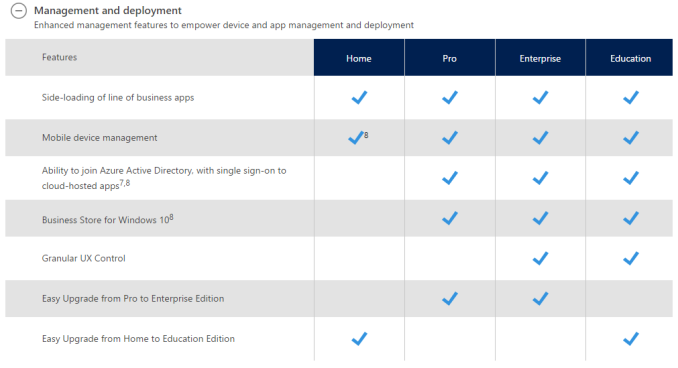
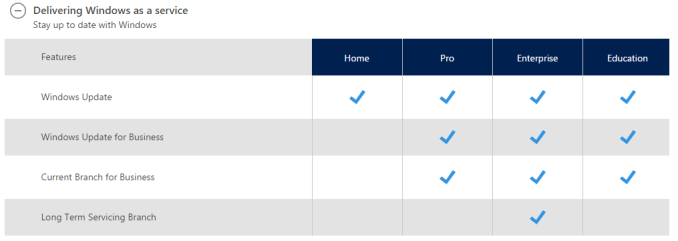
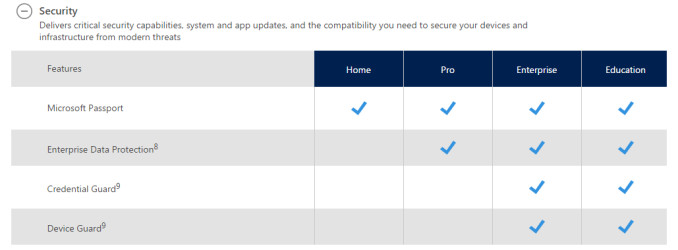








293 Comments
View All Comments
inighthawki - Tuesday, August 25, 2015 - link
Lol this image is so full of crap. Not only can you turn most of it off permanently (And yes, you can disable WU and WD from the services list and it will not start back up) but this image is so misleading. They even photoshopped an ad in the start menu on a setting that doesn't even exist in the RTM build... Come on, that's low. Mos tof the other things such as "tracking keystrokes and browsing history" for wbe browsing exist in Windows 7 and 8. Wi-Fi sense has been known to be blown way out of proportion. Telemtry has also been proven to only provide non-personal information. It collects stuff such as hardware configurations, statistical information like how often you click the start button, and machine crashes. Does this seriously worry you that Microsoft knows that "someone in the world" owns a MacBook pro and clicked the start button 8 times today?You're really just buying into a bunch of fearmongering by a bunch of people who just wanted excuses to continue using Windows 7. If you don't like Windows 10 or don't want to use it, that's fine, but don't cite these ultra poor excuses as the reasons why, as it shows you didn't actually look much further than the surface, and just jumped on the bandwagon.
Notmyusualid - Tuesday, August 25, 2015 - link
Thank you for your (what I believe is an incorrect opinion), but I HAVE EVERYTHING TURNED OFF, and my firewall logs STILL show encrypted packets going out to Microsoft - EVERYTIME I hit a key, and everytime I open a program.So even if somebody starts with a Microsoft Account, their data would be synced to MS, before many would realise what had happened.
There is absoultely nothing you can say that would make me believe that MS deserves access to my contacts. Those are private.
And no, I did not jump on any bandwagon, I did my own testing, came to similar conslusion as the picture stated, and yes, I will be continuing to use Win 7, as I do not like it.
Only Enterprise Editions can disable all modes of telemetry...
inighthawki - Tuesday, August 25, 2015 - link
Oh OK, so you saw encrypted packets going out... So I guess you decrypted them and looked at the content, then? Sending information when certain types of hardware interrupts occur does not mean they are sending personal information or recording your keystrokes like a keylogger. You have no way of knowing what's in the packets, yet you make assumptions that it's a privacy issue. Yet another example of someone pretending they're fully informed because they open up Wireshark and see some packets being sent over the network and "came to a conclusion" about what was really happening.minijedimaster - Tuesday, August 25, 2015 - link
Are you paid to have some shill answer for everything windows 10? "Oh well, so you proved me wrong with your firewall packet captures, but do you REALLY know what it's sending???"LOL, yeah ok... go be a paid shill somewhere else.
inighthawki - Tuesday, August 25, 2015 - link
Sorry if I'm not irrational/paranoid and don't jump to conclusions based on evidence that doesn't actually show any of the claims you're making.Oh no, a network packet! My entire life must now belong to Microsoft's hands!
SlyNine - Tuesday, August 25, 2015 - link
I have to disagree. Your computer sending encrypted packets to Microsoft, even tho you supposedly disabled that stuff, is a HUGE red flag. At that point its up to Microsoft to convince me that they are NOT sending personal information (it shouldn't be sending any). I might have to pass on windows 10 until this gets clarification.imaheadcase - Wednesday, August 26, 2015 - link
Most modern windows OS send data to MS encrypted, almost all programs with internet connectivity do. The OP is prob just looking at the encrypted data it sends to check for windows updates. Has nothing to do with privacy.Holy hell did everyone just step on the jump to conclusions mat. lol
Notmyusualid - Friday, August 28, 2015 - link
It has everything to do with privacy.Every time I press a key, a packet is sent. This is not updates.
Notmyusualid - Friday, August 28, 2015 - link
It IS a Huge Red Flag.This guy is a Microsoft employee.
nikon133 - Sunday, August 30, 2015 - link
You sound like you might be working for competition, though. Apple? Some shady Linux brotherhood? Just saying.